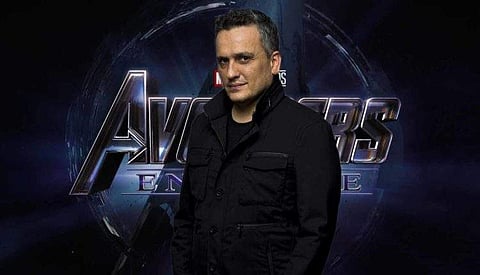

“BRING… ME… THANOS!” screamed Thor, at the end of Avengers: Infinity War. If you screwed up your eyes and really concentrated, you may have heard a hundred thousand screams of rapture emerge from theatres across the world at the same time, including from, of course, the cinema-mad India. In fact, one such video — of Indian fans screaming themselves hoarse for the Thor appearance in Wakanda — went viral, and eventually ended up on the phone screens of the Russo brothers. “We got the chills watching that video,” says Joe Russo, whose first stop in his tour to promote Avengers: Endgame is India. “I decided to come to India first, because of that clip. Every time my brother and I would feel low, we would watch that video to get ourselves going. It’s incredibly gratifying to be able to reach out to fans across the globe, like this.” The other Russo, Anthony, couldn’t join him on the tour, as “work on the VFX is still ongoing.”
It’s futile to try to prise out any important details about Avengers: Endgame from him (as, in his words, “Thanos demands my silence”); so instead, I focus the conversation with Joe Russo on Thanos himself, the central character of Infinity War, who wiped out half the universe with a snap of his fingers (which has now come to be referred as ‘The Decimation’). Thanos is a fascinating villain, among the best we have got in recent times. He’s dogged in his pursuit of goal, and yet, unlike many of his ilk in fiction, isn’t devoid of emotion. “It’s hard when you are working with villains,” begins Joe Russo. “The standard response of the audience is to box the villain and say they can’t relate to his sociopathy.” The first step for the Russo brothers was then to look to make him vicious, yes, but more crucially, to make him relatable. “That’s why Infinity War is told through his eyes,” he reveals. “It also helps that despite his sociopathic tendencies, there are altruistic motivations attached to his goal. He has this monastic dedication to achieving it.” It was important for the Russo brothers to make the audience truly understand Thanos’ perspective, even if they vehemently disagreed with it. This explains why even the horror scene of Thanos committing filicide by killing Gamora, drew from us a range of emotions including, fascinatingly, empathy.
I suggest that this extreme conviction in his agenda is reminiscent of real-world villains like Adolf Hitler. Russo agrees: “No doubt. Nobody thinks of themselves as a villain. They just think they are fervently passionate about their point of view. If their perspective is broken, it’s not broken to them.” This begs the question of whether unshakeable faith, in itself, is an undesirable trait. Russo doesn’t think it’s a problem always. “I think unshakeable faith can be a great trait if it’s a positive goal you are trying to achieve. When it’s not, we judge such characters by our morality.”
Many characters of Marvel — even the good ones — can be differentiated by their unique outlook on life, their differing morality. Russo loves that and thinks that why we each have our unique, favourite characters from the Marvel Cinematic Universe. “Be it the complete morality of a Captain America or the amorality of a Deadpool, these archetypal characters are designed to appeal to different people. This is what is so fantastic about superhero films,” he says. Superhero characters are archetypes, and superhero fiction is, in essence, contemporary mythology. “As directors, we are trying to make mythology belong into a psychologically real place. We are trying to humanise these characters and guide them into interactions that are human. This is what makes you care about them, even though they wear silly costumes and run around with props.”
As fans, when presented with the vast chasm that is a one-year gap in between two highly anticipated films, we dwell, discuss, and develop theories — if only to make the break less harrowing. And on occasion, we wonder if filmmakers ever pay heed to such online conversations. Russo assures he does. “I do read them, and try to stay connected,” he says. There’s one viral theory that suggests that Thanos will be killed by Ant-man, when the latter shrinks, goes into him through his posterior, and then enlarges to explode out of him. Russo has formerly acknowledged that he’s aware of this theory. “An idea can come from someone in India, travel to China, and reach a total stranger in the United Kingdom,” he says. “It binds people through their common love for stories.” He isn’t particularly perturbed though that someone may figure out the details of End-game, which, he has previously admitted, has more twists than Infinity War. “It’s rarely that someone hits upon the central plot of the film. I doubt anyone would have expected half the characters to get killed at the end of Infinity War,” he says, to make his case. “Our job is to subvert all their expectations.” “The end is near,” Thanos warned in Infinity War. Given there’s hardly three weeks before the release of the grand finale, it’s, with much relief, that I say that the Endgame is near too.